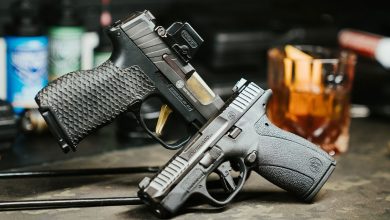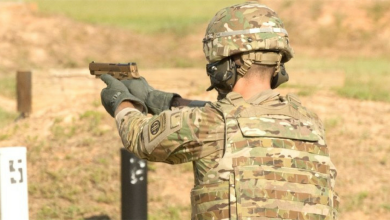Carrying a Gun at Work: Weighing Legal Risks and Personal Safety

Crime and violence can find us anywhere, including at work. According to The Violence Project, there were 53 workplace mass shootings between 1966 and 2021. That represents 30% of the 188 mass shootings recorded during that period, with retail locations at 17% and restaurants at 13.4%. And that doesn’t include shootings related to robberies in the types of businesses where one is a possibility, not to mention people who work outside or make deliveries.
Those statistics make carrying a gun at work a good idea. However, it is not as straightforward as simply deciding whether to carry a gun at work or not. There are multiple considerations that should not be ignored.
State and Federal Law
The biggest consideration, and the one with the most potentially severe ramifications, is state and federal laws regarding concealed firearms. The Second Amendment and a concealed carry permit are both trumped by laws prohibiting firearm possession in certain places. The best known of these is probably the post office, but others may include schools, airports, courthouses, and even some parks and wildlife refuges. Be sure to check your state’s laws as well. If your work takes you to any place where it is against the law to carry a gun, you could face serious trouble if caught.
Legally Designated No Gun Zones
There are two kinds of ‘No Gun Zones,’ those prohibited by law and those prohibited by company policy. Some private businesses, like malls and movie theaters, have policies prohibiting guns. As such, you cannot be charged with a crime for carrying one, they can only ask you to leave. However, in many states, there are laws prohibiting the possession of a firearm within a specified distance of places like schools, churches, or hospitals. If your place of employment falls within those distances, you could be breaking the law if you carry a gun at work. It’s important to understand the difference.
Employer Company Policy
In the vast majority of situations, it is the policy of your employer that you must consider when deciding to carry a concealed firearm at work. Saying you were not aware of a no-gun policy if you get caught will probably not do you any good, since it is your responsibility to know your employer’s policies. I do not suggest asking anyone, as that could bring unwanted attention to yourself. Instead, look it up on the employee website or in the documents you were provided with when you were hired. While some companies may have no-gun policies because of their political or moral stance on firearms, more often it is simply a matter of insurance costs and liability considerations. Insurance companies and attorneys generally advise that if anything should happen, such as an employee having a negligent discharge, the company is safer from litigation if it has a no-gun policy.
Weighing the Pros and Cons
Go to any gun forum and find a thread discussing carrying at work, and someone will invariably comment that they’d rather be unemployed and alive, than follow a no-gun policy and be dead. On the surface, all of us would agree with that. But getting fired because you had to use your gun at work is the exception to losing your job rather than the rule. More often, someone simply finds out you are carrying through some mundane interaction, and it all goes downhill from there. Whether to carry at work is not a decision to be made lightly, especially if your workplace does not allow it. The pros and cons should be carefully considered.
The greatest advantage is that you will not be unarmed if you are suddenly forced to defend yourself or others. Your firearm will also be under your control at all times, you will not have to worry about how you are going to retrieve it quickly from your vehicle if you need it. You will know where it is and that it is available. It will also not be in your vehicle where it can be stolen while you are at work.
At the top of the downside list is the fact that if your workplace has a no-guns policy, you could lose your job if someone finds out you are carrying. That means that throughout your workday, you will need to ensure that there is no possibility that someone might discover you are armed. Your gun must remain concealed whether you are sitting at a desk, going to a meeting, moving heavy objects, or using the restroom. Unexpected and unforeseen circumstances can also crop up to create complications. For example, if you have a medical emergency of any kind and First Responders are summoned, they will likely discover your firearm. Finally, if your firearm inadvertently discharges through negligence or some bizarre mechanical failure, you may not only get fired but you could be arrested or find yourself in civil court.
Pros:
- You will not be unarmed in the event of a life-or-death incident.
- Your firearm is not sitting in your vehicle where it can be stolen while you are at work.
- Your firearm is under your control at all times.
Cons:
- If your workplace has a no-guns policy you could lose your job.
- You must be especially aware to ensure your firearm is concealed at all times.
- Depending on the type of work you do, normal movement could make keeping your firearm concealed more challenging.
- If you have a medical emergency, it could reveal the fact that you are armed.
- If your weapon unintentionally discharges and causes physical or emotional harm to anyone in your workplace, along with being terminated, you could face criminal charges and civil liability.
Keeping Your Gun Concealed
In the spirit of full disclosure, I will tell you that I carry everywhere it is legal, including work. These days I no longer leave home to go to work, but when I did, I carried a concealed firearm, and if I ever have to go to a job outside my home again, I will carry then. In all the years I carried a gun at work, no one ever found out I was armed. I generally carried a micro in a pocket holster and wore pants that had pockets that concealed it well, so I know it can be done.
Obviously, you should ensure that your concealed firearm is always concealed whether you are going to the supermarket, to a movie, or out to eat. If someone sees your poorly concealed handgun it not only reduces your tactical advantage, but if the person seeing it is anti-gun or just afraid of guns, it can create a stir, and perhaps even precipitate an incident you would be better off without. That is doubly true at work. Even if your company is pro-2A, someone who is anti-gun or just uncomfortable around guns who sees your gun could create problems if they complain about it. If your workplace has a no-guns policy, you could lose your job.
This makes your choice of clothing and carry method critically important. 5.11 used to make covert carry pants that had hidden pockets for a weapon situated behind the regular pockets. The weapon pockets had hidden zippers to secure them and even had built-in magazine compartments. They have been discontinued, but I still have some and wear them in especially nonpermissive environments.
Even without special clothing, it is possible to ensure your firearm is concealed no matter how you move your body. If you use an IWB holster, ensure that it rides low enough at your waist and that your shirt will always cover it. Belly bands or special undergarments like the 5.11 Tactical Men’s Holster Shirt will provide better concealment than most IWB holsters. Ankle holsters are another possibility, but present some challenges involving the potential for your pant-leg to ride up and limiting the size of the gun you can carry. Pocket carry is another option, as long as you are fine with a micro-sized gun. Whatever method you decide on, make some dry runs by wearing your work clothes and carrying your gun around the house for a few days to ensure it is well and truly concealed no matter what you are doing.
The Decision is Yours
Should you carry a gun at work? The decision is yours, and yours alone. If you want to be armed at all times, then the answer is yes, but it is not a decision to be made lightly. Be certain you understand your employer’s policies and any laws that may affect your workplace or anywhere you may have to go for work. If I were an employer, I would authorize my employees to be legally armed without hesitation, but this is not the case with every employer. As with every other important decision we make in life, make it with your eyes open.
Read the full article here






